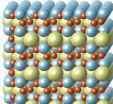(Press-News.org) LIVERMORE, Calif. -- Volcanic eruptions in the early part of the 21st century have cooled the planet, according to a study led by Lawrence Livermore National Laboratory. This cooling partly offset the warming produced by greenhouse gases.
Despite continuing increases in atmospheric levels of greenhouse gases, and in the total heat content of the ocean, global-mean temperatures at the surface of the planet and in the troposphere (the lowest portion of the Earth's atmosphere) have shown relatively little warming since 1998. This so-called 'slow-down' or 'hiatus' has received considerable scientific, political and popular attention. The volcanic contribution to the 'slow-down' is the subject of a new paper appearing in the Feb. 23 edition of the journal Nature Geoscience.
Volcanic eruptions inject sulfur dioxide gas into the atmosphere. If the eruptions are large enough to add sulfur dioxide to the stratosphere (the atmospheric layer above the troposphere), the gas forms tiny droplets of sulfuric acid, also known as "volcanic aerosols." These droplets reflect some portion of the incoming sunlight back into space, cooling the Earth's surface and the lower atmosphere.
"In the last decade, the amount of volcanic aerosol in the stratosphere has increased, so more sunlight is being reflected back into space," said Lawrence Livermore climate scientist Benjamin Santer, who serves as lead author of the study. "This has created a natural cooling of the planet and has partly offset the increase in surface and atmospheric temperatures due to human influence."
From 2000-2012, emissions of greenhouse gases into the atmosphere have increased -- as they have done since the Industrial Revolution. This human-induced change typically causes the troposphere to warm and the stratosphere to cool. In contrast, large volcanic eruptions cool the troposphere and warm the stratosphere. The researchers report that early 21st century volcanic eruptions have contributed to this recent "warming hiatus," and that most climate models have not accurately accounted for this effect.
"The recent slow-down in observed surface and tropospheric warming is a fascinating detective story," Santer said. "There is not a single culprit, as some scientists have claimed. Multiple factors are implicated. One is the temporary cooling effect of internal climate noise. Other factors are the external cooling influences of 21st century volcanic activity, an unusually low and long minimum in the last solar cycle, and an uptick in Chinese emissions of sulfur dioxide.
" The real scientific challenge is to obtain hard quantitative estimates of the contributions of each of these factors to the slow-down."
The researchers performed two different statistical tests to determine whether recent volcanic eruptions have cooling effects that can be distinguished from the intrinsic variability of the climate. The team found evidence for significant correlations between volcanic aerosol observations and satellite-based estimates of lower tropospheric temperatures as well as the sunlight reflected back to space by the aerosol particles.
"This is the most comprehensive observational evaluation of the role of volcanic activity on climate in the early part of the 21st century," said co-author Susan Solomon, the Ellen Swallow Richards professor of atmospheric chemistry and climate science at MIT. "We assess the contributions of volcanoes on temperatures in the troposphere — the lowest layer of the atmosphere — and find they've certainly played some role in keeping the Earth cooler."
INFORMATION:
The research involved a large, interdisciplinary team of researchers with expertise in climate modeling, satellite data, stratospheric dynamics and volcanic effects on climate, model evaluation and computer science. Other Livermore contributors include Céline Bonfils, Jeff Painter, Mark Zelinka and Karl Taylor. Other collaborators include Carl Mears and Frank Wentz at Remote Sensing Systems, Susan Solomon at the Massachusetts Institute of Technology, Gavin Schmidt and Larissa Nazarenko at the NASA/Goddard Institute for Space Studies, and John Fyfe and Jason Cole at the Canadian Centre for Climate Modeling and Analysis.
Founded in 1952, Lawrence Livermore National Laboratory provides solutions to our nation's most important national security challenges through innovative science, engineering and technology. Lawrence Livermore National Laboratory is managed by Lawrence Livermore National Security, LLC for the U.S. Department of Energy's National Nuclear Security Administration.
Volcanoes contribute to recent warming 'hiatus'
2014-02-24
ELSE PRESS RELEASES FROM THIS DATE:
Personalized medicine best way to treat cancer, study argues
2014-02-24
If a driver is traveling to New York City, I-95 might be their route of choice. But they could also take I-78, I-87 or any number of alternate routes. Most cancers begin similarly, with many possible routes to the same disease. A new study found evidence that assessing the route to cancer on a case-by-case basis might make more sense than basing a patient's cancer treatment on commonly disrupted genes and pathways.
The study found little or no overlap in the most prominent genetic malfunction associated with each individual patient's disease compared to malfunctions ...
On the road to Mottronics
2014-02-24
"Mottronics" is a term seemingly destined to become familiar to aficionados of electronic gadgets. Named for the Nobel laureate Nevill Francis Mott, Mottronics involve materials – mostly metal oxides - that can be induced to transition between electrically conductive and insulating phases. If these phase transitions can be controlled, Mott materials hold great promise for future transistors and memories that feature higher energy efficiencies and faster switching speeds than today's devices. A team of researchers working at Berkeley Lab's Advanced Light Source (ALS) have ...
New ideas change your brain cells: UBC research
2014-02-24
A new University of British Columbia study identifies an important molecular change that occurs in the brain when we learn and remember.
Published this month in Nature Neuroscience, the research shows that learning stimulates our brain cells in a manner that causes a small fatty acid to attach to delta-catenin, a protein in the brain. This biochemical modification is essential in producing the changes in brain cell connectivity associated with learning, the study finds.
In animal models, the scientists found almost twice the amount of modified delta-catenin in the brain ...
Bushfires continue to plague Victoria, Australia
2014-02-24
Reports coming from Australia are more positive than negative now with regards to the Morwell fire, but officials say they still have a "long way to go." Considerable progress has been made in extinguishing the fire, but there is still significant heat that continues to generate smoke from the open mine. Fire activity has been cut in half since February 11, but there are still "weeks of firefighting ahead" according to Craig Lapsley, Fire Services Commissioner on the County Fire Authority website.
According to the Australian News, "The [Morwell] fire, which started ...
Study of Hispanic/Latino health presents initial findings
2014-02-24
February 24, 2014 – (BRONX, NY) –One in every six people in the U.S. is Hispanic/Latino and as a group they live longer than non-Hispanic whites (81.4 years vs. 78.8 years). Yet, despite their strong representation and relative longevity, little is understood about this group's health conditions and behaviors.
The Hispanic Community Health Study/Study of Latinos (HCHS/SOL), the landmark research study of Hispanic/Latino health funded by the National Institutes of Health (NIH), has released initial findings that show significant variations in disease prevalence and health ...
Researcher builds a better job performance review
2014-02-24
MANHATTAN -- A critical job performance evaluation can have a negative effect on any employee, a Kansas State University researcher has found.
By studying how people view positive or negative feedback, Satoris Culbertson, assistant professor of management, has determined that nobody -- even people who are motivated to learn -- likes negative performance reviews. Culbertson is developing ways to help managers improve the process for reviewing employees.
Culbertson and collaborators at Eastern Kentucky University and Texas A&M University surveyed more than 200 staffers ...
Now it will become cheaper to make second-generation biofuel for our cars
2014-02-24
Producing second-generation biofuel from dead plant tissue is environmetally friendly - but it is also expensive because the process as used today needs expensive enzymes, and large companies dominate this market. Now a Danish/Iraqi collaboration presents a new technique that avoids the expensive enzymes. The production of second generation biofuels thus becomes cheaper, probably attracting many more producers and competition, and this may finally bring the price down.
The world's need for fuel will persist, also when the Earth's deposits of fossil fuels run out. Bioethanol, ...
Biomedical bleeding affects horseshoe crab behavior
2014-02-24
DURHAM, N.H. – New research from Plymouth State University and the University of New Hampshire indicates that collecting and bleeding horseshoe crabs for biomedical purposes causes short-term changes in their behavior and physiology that could exacerbate the crabs' population decline in parts of the east coast.
Each year, the U.S. biomedical industry harvests the blue blood from almost half a million living horseshoe crabs for use in pharmaceuticals — most notably, a product called Limulus amebocyte lysate (LAL), used to ensure vaccines and medical equipment are free ...
Significant discrepancies between FISH and IHC results for ALK testing
2014-02-24
DENVER –The findings of a recent study indicate that routine testing with both fluorescent in situ hybridization (FISH) and immunohistochemistry (IHC) may enhance the detection of ALK-positive non-small cell lung cancer (NSCLC). Accurate determination of ALK-positive tumors is necessary to identify patients with advanced NSCLC who are most likely to benefit from targeted therapy with an ALK inhibitor.
The discovery of ALK rearrangement in about 1% to 7% of NSCLCs led to the development of ALK inhibitors, such as crizotinib, which have significantly improved treatment ...
Researchers find flowing water can slow down bacteria
2014-02-24
In a surprising new finding, researchers have discovered that bacterial movement is impeded in flowing water, enhancing the likelihood that the microbes will attach to surfaces. The new work could have implications for the study of marine ecosystems, and for our understanding of how infections take hold in medical devices.
The findings, the result of microscopic analysis of bacteria inside microfluidic devices, were made by MIT postdoc Roberto Rusconi, former MIT postdoc Jeffrey Guasto (now an assistant professor of mechanical engineering at Tufts University), and Roman ...




